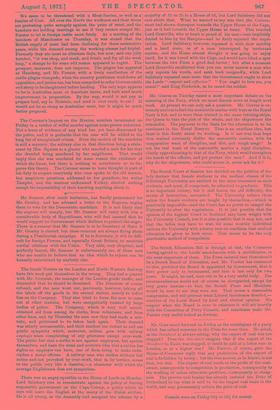The Goods' Porters on the London and North-Western Railway have
this week put themselves in the wrong. They had a quarrel with Mr. Greenish, the manager of the London goods' traffic, and -demanded that he should be dismissed. The Directors of course refused, and the men went out, previously, however, taking all the labels off the goods in the central station, merely to inflict loss on the Company. They also tried to force the men to come out at other stations, but were energetically resisted by large bodies of police. The Company, which is very well served, -obtained aid from among its clerks, from volunteers, and from -other lines, and by Thursday the men saw they had made a mis- take, and petitioned to be taken back again. Their demand was utterly unreasonable, and their conduct too violent to call out public sympathy which, moreover, seldom goes with railway .employes when complaining of any grievance except over-work. The public feel that a strike is not against employers, but against themselves, and have the usual and accurate idea that a nation has rights no employer can have, one of them being to make indis- cipline a moral offence. A railway man who strikes without full notice and not provoked by over-work, that is, by torture, seems to the public very like a deserter,—a character with which the average Englishman does not sympathise.


































 Previous page
Previous page